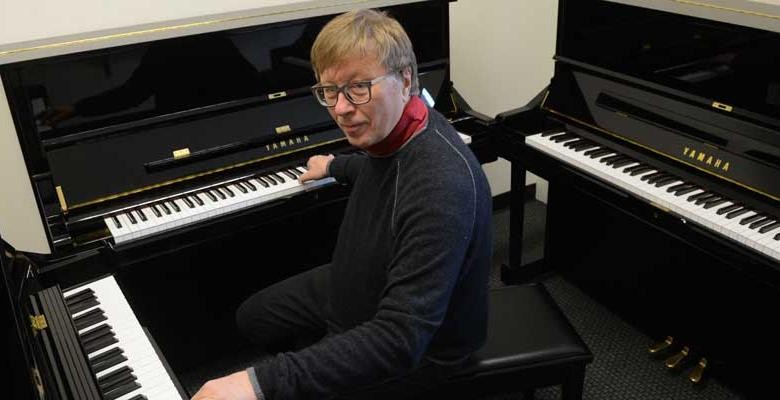Pitch Perfect: Columbia Music Department Embraces Microtonal Music of Georg Friedrich Haas

When the Berlin Philharmonic performed the Georg Friedrich Haas piece dark dreams at Carnegie Hall last October, critics were ecstatic and some audience members booed. Anthony Tommasini, reviewing the concert in The New York Times, noted that “new pieces are not often booed. I hope Mr. Haas feels that he was doing something right to arouse such a reaction.”
Haas, who joined Columbia’s Music Department in September 2013 as the MacDowell Professor of Music, believes he was. “The booing proves that I make people nervous and that’s fine. New music always has to do that. If my music would be 100 percent accepted, I would be sure that I did something wrong.”
Haas, an Austrian who has emerged as one of the major composers of his generation, arrived at Columbia after teaching for many years at the Hochschule für Musik in Basel, Switzerland and the Kunstuniversität in Graz, Austria.
Listen: in vain
“I turned 60 on August 16, 2013, the day I signed my contract with Columbia. To arrive here at my age, when some of my colleagues are retiring, and start a new chapter is a challenge and an amazing opportunity.”
Haas’ visceral music blends the Austrian tradition of grand orchestral statement with contemporary trends in harmonic color and microtonality, a system that divides the conventional scale of Western classical music into many more than its usual 12 semitone pitches. Critics have described his avant-garde compositions as “exploratory and uncompromising,” yet also “lush and evocative.”
Haas’ hour-long in vain, for 24 musicians, is considered one of the most pathbreaking new compositions in the past quarter century. In that piece, as in others, he experiments with the possibilities of music performed in the dark. His third string quartet, In iij. Noct., is played in complete darkness; the musicians can see neither their music nor their fellow performers.
Listen: In iij. Noct.
Alex Ross, writing about the piece in The New Yorker, says, “Anyone who feels too uncomfortable … can leave before the music begins. … It’s like being buried alive. But the sounds that Haas elicits from the quartet—a minutely varied array of musical cries, whispers, songs and sighs—gradually allow the ears to map a space that the eyes cannot see. … What begins as an experience of deprivation becomes one of radically heightened awareness.”
Haas has composed several operas and concertos and a variety of chamber works, including eight string quartets. He has received numerous national and international prizes, including the Grand Austrian State Prize for Music, the country’s highest artistic honor.
He works in a narrow studio in Dodge Hall with three upright Yamaha pianos, one tuned according to standard pitch and the other two to pitches smaller than a half step to accommodate his own microtonal compositions and his teaching. Columbia’s piano tuner, Daniel Johnson, has to use an app called CyberTuner to maintain their distinctive sounds.
Listen: String Quartet No. 8
Music Department chair Susan Boynton says graduate students in the doctoral composition program and undergraduate music majors are lucky to have the chance to work with Haas. “It’s refreshing to see someone so prominent investing extensive thought and sustained energy into the education of the next generation of composers,” she said.
Haas, in turn, is very impressed with his students. “Many of them have the chance of an international career. It’s key for them to learn that the most important thing in music is the result, not the process. You can find an amazing structure of fantastic thoughts in a piece, but if the result sounds terrible, then you have to change the process. I don’t teach to trust in the result, but in the student’s own perception.”
Listen: I can't breathe (In memoriam Eric Garner)
This semester Haas is teaching two graduate courses, one in orchestration and the other in composition. He also gives composition lessons privately to graduate students and in a group to undergrads. On Feb. 24, the JACK Quartet performed the American premiere of Haas’ new String Quartet No. 8 at the Miller Theatre.
Review: The Jack and the Calder Quartet in Concert, The New York Times, February 25
Haas does not shy away from introducing politics into his music. Among his current projects is I can’t breathe, a trumpet solo he composed in December after a New York City grand jury declined to indict the police officer whose chokehold led to the death of Eric Garner in Staten Island last summer.
“It’s a reaction to the news, which I was very depressed about. Artists have a duty to express themselves politically and be a moral guide.”